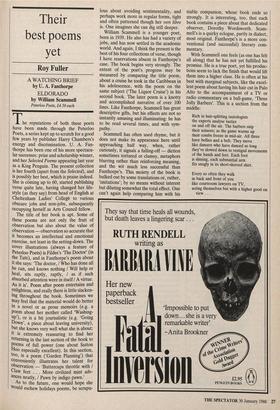Their best poems yet
Roy Fuller
A WATCHING BRIEF by U. A. Fanthorpe ELDORADO by William Scanunell
Peterloo Poets, £4.50 each
The reputations of both these poets have been made through the Peterloo Poets, a series kept up to scratch for a good few years by publisher Harry Chambers's energy and discrimination. U. A. Fan- thorpe has been one of his more spectacu- lar successes: prize and scholarship winner, and her Selected Poems appearing last year as a King Penguin. The present collection is her fourth (apart from the Selected), and is possibly her best, which is praise indeed. She is aiming up to 60, started publishing verse quite late, having changed her life- style (as they say) from head of English at Cheltenham Ladies' College to various obscure jobs and non-jobs, subsequently occupying herself as Arts Council fellow. The title of her book is apt. Some of these poems are not only the fruit of observation but also about the value of observation — observation so accurate that it becomes an intellectual and emotional exercise, not least in the setting-down. The cover illustrations (always a feature of Peterloo Poets) is Fildes's 'The Doctor' (in the Tate), and in Fanthorpe's poem about it she says: 'The doctor, / Who has done all he can, and knows nothing / Will help or heal, sits raptly, raptly, / as if such absorbed attention were in itself! A virtue. As it is'. Poem after poem entertains and enlightens, and really there is little slacken- ing throughout the book. Sometimes we may feel that the material would do better in a novel or as prose memoirs (e.g. a poem about her mother called 'Washing- up'), or is a bit journalistic (e.g. 'Going Down', a piece about leaving university), but she knows very well what she is about: it is extremely reassuring to find her returning in the last section of the book to Poems of full power (one about Sutton Hoo especially excellent). In this section, too, is a poem (`Garden Planning') that Conveniently illustrates her talent for observation — 'Buttercups throttle with / Claw feet . . . More civilized mint adv- ances neatly, / Pawn by indigo pawn.' As to the future, one would hope she would eschew holidays poems, be scrupu- lous about avoiding sentimentality, and perhaps work more in regular forms, tight and often patterned though her vers libre is. One imagines she can dig still deeper.
William Scammell is a younger poet, born in 1939. He also has had a variety of jobs, and has now settled in the academic world. And again, I think the present is the best of his four collections of verse, though I have reservations absent in Fanthorpe's case. The book begins very strongly. The extent of the poet's progress may be measured by comparing the title poem, about a cruise he took in the Caribbean in his adolescence, with the poem on the same subject (`The Liquor Cruise') in his second book. The later poem is a knotty and accomplished narrative of over 100 lines. Like Fanthorpe, Scammell has great descriptive gifts, but his effects are not so instantly amusing and illuminating: he has to be read several times, and with sym- pathy.
Scammell has often used rhyme, but it does not make its appearance here until approaching half way, when, rather curiously, it signals a falling-off — diction sometimes tortured or clumsy, metaphors blurring rather than reinforcing meaning, and the wit much less successful than Fanthorpe's. This moiety of the book is bulked out by some translations or, rather, 'imitations'; by no means without interest but diluting somewhat the total effect. One can't again help comparing him with his stable companion, whose book ends so strongly. It is interesting, too, that each book contains a piece about that dedicated observer, Dorothy Wordsworth. Scam- mell's is a quirky eclogue, partly in dialect, most original. Fanthorpe's is a more con- ventional (and successful) literary com- mentary.
With Scammell one feels (as one has felt all along) that he has not yet fulfilled his promise. He is a true poet, yet his produc- tions seem to lack the finish that would lift them into a higher class. He is often at his best with marginal subjects, like the excel- lent poem about having his hair cut in Palo Alto to the accompaniment of a TV or radio commentary on a ball-game, 'Three Jolly Barbers'. This is a section from the middle:
Rich in hair-splitting tautologists the experts analyse tactics on and off the air. The barbers snip their scissors; as the game warms up their combs freeze in mid-air. All three have bellies and a belt. They move like dancers who have danced so long they've slowed down to vestigial movements of the hands and feet. Each foot is shining, each substantial arm fits snugly in its short-sleeved shirt.
Every so often they walk in back and front of you like courtroom lawyers on TV, acting themselves but with a higher good on view. . .


















































 Previous page
Previous page